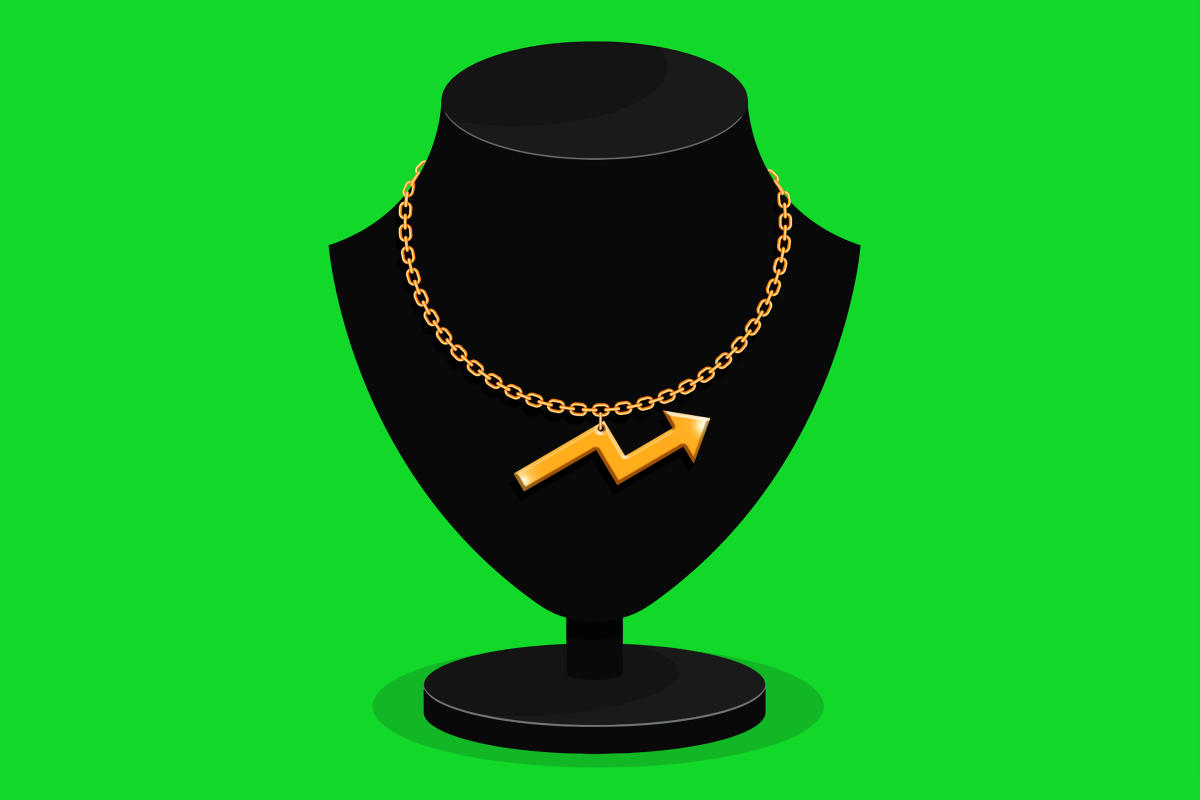Personal Finance
How to Buy Gold

***Money is not a client of any investment adviser featured on this page. The information provided on this page is for educational purposes only and is not intended as investment advice. Money does not offer advisory services.***
-
Near-Perfect Trustpilot Score of 4.9 Stars
American Hartford Gold Group
Our Partner
-
Company Highlight:
Simple application process that takes minutes
-
Available Metals:
Gold and silver
-
Custodian:
Equity Trust Company
-
Depository:
Equity Trust, Brinks, Delaware Depository, International Depository Services
-
BBB Grade:
A+
Invest in Gold
-
-
Highest Price Buy Back Guarantee
Goldco
Our Partner
-
Company Highlight:
Offers a wide variety of gold IRA-approved coins and silver products
-
Available Metals:
Gold, silver, platinum, palladium
-
Custodian:
Various alternatives but the company suggests Sterling Trust
-
Depository:
Delaware Depository
-
BBB Grade:
A+
Invest in Gold
-
-
Direct-Delivery and Vault Storage Options
AdvantageGold
Our Partner
-
Company Highlight:
Open new and roll-over IRAs online or via phone
-
Available Metals:
Gold, silver, platinum, palladium
-
Custodian:
Equity Trust, STRATA Trust Company
-
Depository:
Delaware Depository
-
BBB Grade:
A+
Invest in Gold
-
-
Educates Consumers on Red Flags to Watch For
Augusta Precious Metals
Our Partner
-
Company Highlight:
Informative educational video library
-
Available Metals:
Gold, silver
-
Custodian:
Equity Trust, Gold Star Trust Company, Kingdom Trust
-
Depository:
Delaware Depository Service Company
-
BBB Grade:
A+
Invest in Gold
-
For thousands of years humans have coveted gold — and today’s investors are no exception. Whether you plan to buy the metal in the form of coins, bars or gold-backed securities, there are plenty of reasons to add it to your portfolio.
Gold is considered a “safe haven asset” because when prices for other investments, like stocks or real estate, drop sharply, gold doesn’t lose its value. In fact, it may even significantly gain value when other investments fail, as panicked investors rush to buy something safer.
What’s more, some experts also see gold as the ultimate way to protect your savings against rising prices since it’s held value for hundreds of years.
But when does it really make sense to invest in gold? And what’s the best method? Here’s everything you need to know about how to buy gold in 2023, including the benefits and downsides of buying physical gold or investing in the different types of gold-backed securities.
Table of contents
-
Buying gold
-
Gold bullion
-
Gold ETFs
-
Gold mutual funds
-
Gold mining stocks
-
Gold futures contracts
-
Should You Buy Gold
-
How to Buy Gold FAQ
Buying gold
There are two main ways to buy gold: purchasing physical gold, or investing in a gold-related stocks, mutual funds or exchange-traded funds (ETFs).
Depending on your investment strategy, expertise and the level of risk you’re willing to take, you may invest in any of the options below.
Gold bullion
Bullion is physical gold of high purity — usually in the form of ingots, bars, coins or rounds. (Rounds are often confused for coins because of their circular shape, but are closer to gold bars in that they don’t have legal tender and don’t differ in design from one year to the next).
Bullion derives its value from the gold content of the precious metal rather than the form of the metal. You can purchase gold bars in different weights — from just a gram costing less than $100 to 400 ounces — costing around $700,000, identical to the ones held by governments in places like Fort Knox.
Investment-quality gold bars are 99.5% (995) pure gold, the international standard. Legitimate bars are stamped with the manufacturer’s name, purity and the weight.
Benefits of buying gold bullion
-
You own a physical, valuable asset that can be easily passed on to others
-
Stable value
-
You don’t need to keep an eye on it like you would a portfolio of stocks and bonds
Downsides of buying gold bullions
-
You might need a secure storage facility or insurance to protect it
-
Should only buy from a reputable manufacturer
-
Might be difficult to determine gold purity on your own
-
Gold dealers typically charge significant mark-ups when you buy or sell. In some cases these may be 10% or more of the gold’s value.
How to buy gold bullion
Gold bullion bars and rounds are generally sold and mailed to you by online gold retailers. These retailers frequently offer discounts to members of the military and for buying in bulk. Sellers will usually mark up the price of physical gold, so you’ll likely pay more than the actual value.
Some retailers consider buying more than 100 gold bars (or 500 gold coins) a “bulk” purchase, but this will depend largely on the seller.
You may also be able to buy smaller gold bars, ranging from half a gram up to 100 grams, in stores that specialize in numismatics, pawn shops or some jewelry stores.
Where to buy gold bars
Some well-known retailers that sell gold bars include:
-
JM Bullion
-
APMEX
-
Provident Metals
-
Westminster Mint
-
Money Metals Exchange
Where to buy gold coins
Several governments, including the U.S., as well as many private mints currently manufacture gold coins.
Some of the most well-known government gold mints in the world include:
-
The U.S. Mint
-
Royal Canadian Mint
-
Royal Mint of the United Kingdom
-
The Central Mint of the People’s Bank of China
-
The Perth Mint in Australia
Some of the most well-known privately-owned gold mints in the world include:
-
New Zealand Mint
-
Sunshine Minting
-
Valcambi
-
Austrian Mint
-
South African Mint
-
Geiger Edelmetalle
-
PAMP Suisse
Coins issued by the U.S. Mint are technically legal tender, meaning that they could in theory be used to pay for goods at a retail store. However, the value of their gold tends to be much higher than their face value. For example, a one-ounce American Gold Eagle 2019 coin’s face value is $50, but its real value is more than $1,500 .
Collectible coins may have an even higher market value due to their rarity or if there is high demand. And remember, sellers will charge you more than the actual gold’s value.
Popular minted coins include:
-
American Eagle
-
Gold Buffalo
-
Canadian Maple Leaf
-
South African Krugerrand
-
Vienna Philharmonic
-
Mexican Gold 50 Pesos
-
British Sovereign
-
Australian Kangaroo
Minted coins usually range in size from one-tenth of an ounce to an ounce to accommodate different investors’ buying power. Their purity is usually between 22 and 24 karats, with the purity guaranteed by the mints that produce them.
You can buy gold bullion coins from:
-
Mints that manufacture them
-
Coin shops
-
Online dealers
-
eBay
-
Coin shows
Where to buy jewelry
When buying gold jewelry, keep in mind that the price you pay will be tied to the craftsmanship of the piece and that the amount of gold it contains will be just a percentage (karat) of its overall weight. In effect, this means you’ll be paying more money for less gold.
For instance, the most common type of gold used in jewelry in the U.S. is 14K gold, produced from 58.3% pure gold and 41.7% of other metals like copper and silver. Other common mixtures of gold are 18K, and 22K.
Some jewelry merchants take steps to reassure customers their gold does not come from areas of armed conflict. These pieces are often sold with the tags “ethical” or “sustainable.” For example, Fairmined jewelry may have a Fairmined stamp to assure it comes from a responsibly-managed community mine.
How to invest in gold
Aside from buying physical gold, you can invest in a variety of gold-backed securities through investment companies, brokerage accounts or gold IRAs. These include gold ETFs, gold mutual funds, mining stocks and futures contracts.
Read on to learn about these securities: what they are, how to buy them, alongside its advantages and disadvantages.
Gold ETFs
Gold ETFs own physical gold on your behalf. In other words, the ETF may own gold in a vault in London, but you can sit in the U.S. and buy or sell that ETF from your couch.
Benefits of buying gold ETFs
-
No storage needed, ETFs’ bars of gold are stored in a bank vault
-
ETFs offer simple, beginner-friendly options
Downsides of buying gold ETFs
-
Charge a small management fee
-
Require familiarity with ETF investing to buy and sell
Ways to buy gold ETFs
Investors buy shares in the fund through a brokerage, whether in-person or online. ETFs charge fees, but they tend to be lower than fees charged by gold mutual funds. They may also be lower than what it costs to insure and store gold in a facility like a safety deposit box. On average, ETFs charge annual fees of 0.59% of assets invested ($59 per $10,000 invested), according to ETF.com.
While you’ll likely want to buy ETFs that actually own physical gold, there are funds that invest in companies in the gold industry, often either gold mining stocks or gold streaming companies that provide financing for gold miners.
Some of the popular gold ETFs that trade in the U.S. are:
-
SPDR Gold Shares ETF (GLD)
-
iShares Gold Trust ETF (IAU)
-
SPDR Gold MiniShares Trust (GLDM)
-
Aberdeen Standard Physical Gold Shares ETF (SGOL)
-
GraniteShares Gold Trust (BAR)
-
VanEck Merk Gold (OUNZ)
Gold mutual funds
Gold mutual funds, which pool money from multiple investors and manage it on your behalf, typically invest in gold mining or refining companies’ stocks, though some own small amounts of bullion too.
Mutual fund fees tend to be higher than those of ETFs because they’re usually actively managed, meaning there’s a fund manager or team of people conducting research, analyzing potential investments and then making investment decisions for the fund.
Benefits of buying gold mutual funds
-
You don’t have to research individual gold mining companies
-
Can be easily bought through a brokerage firm
Downsides of buying gold mutual funds
-
Mutual funds charge different fees and expenses, which can vary depending on the services it provides
-
Value of gold mutual funds can be more volatile than physical gold
Ways to buy gold mutual funds
Mutual funds can be purchased through a brokerage (in-person or online) or via online stock trading apps.
Some of the gold mutual funds that trade in the U.S. stock market are:
-
Sprott Gold Equity Fund (SGDIX)
-
Franklin Gold and Precious Metals Fund (FKRCX)
-
Gabelli Gold Fund Class AAA (GOLDX)
-
Invesco Gold and Special Minerals FD (OPGSX)
-
US Global Investors and Prec Mtls Fd (USERX)
-
First Eagle Gold Fund (SGGDX)
-
Van Eck International Investors Gold Fund (INIVX)
-
USAA Precious Metals and Minerals Fund (USAGX)
-
Fidelity® Select Gold Portfolio (FGDAX)
Gold mining stocks
Rather than investing in a mutual fund, you could also buy stocks in gold mining companies (often called gold stocks) directly.
Benefits of buying gold mining stocks
-
Pay dividends, which you can’t otherwise earn with gold bullions
-
Can be bought in fractions on many investment apps
Downsides of buying gold mining stocks
-
Gold mining stocks tend to be more volatile than gold itself
-
Stock prices are susceptible to factors outside of the price of gold, like company management decisions
Ways to buy gold mining stocks
Buying gold mining stocks is relatively simple, via a brokerage account with an online broker or an investment app. Once you add funds to your account, you can pick a gold stock and place an order.
Some major players in the gold mining industry are:
-
Barrick Gold (GOLD)
-
Newmont Corp. (NEM)
-
Newcrest Mining Ltd. (NCM)
-
Kinross Gold Corp. (K.TO)
-
B2Gold Corp. (BTO.TO)
-
AngloGold Ashanti (AU)
-
Karora Resources Inc. (KRR.TO)
-
Sibanye-Stillwater Ltd. (SBSW)
-
Dundee Precious Metals Inc. (DPM.TO)
Gold futures contracts
Gold futures are mostly for professionals, not novice investors. Gold futures contracts are agreements between two parties to trade a certain amount of gold at a set price at a future time. When the contract “settles” or comes due, the seller delivers the gold to the buyer and collects the agreed-on price.
The contracts (whose value can also be settled for cash) can be traded among speculators who hope to make money by betting that gold will increase (or decrease) in value before the settlement date. Futures contracts are usually for 100 troy ounces of gold, while their prices are quoted in U.S. dollars per ounce.
Benefits to buying gold futures contracts
-
You can manage positions nearly 24 hours a day
-
Considerable high liquidity and low execution cost
Downsides to buying gold futures contracts
-
You can lose more than your original investment
-
Not suitable for beginners
-
Ways to buy gold futures contracts
In the U.S., gold futures are traded in the New York Mercantile Exchange (NYMEX).
To buy gold futures contracts, you need a brokerage account with a full-service broker that support futures trading, such as Charles Shwab, E*Trade or TD Ameritrade. You may also open an account directly with CME Group, the derivatives marketplace that manages NYMEX.
Futures exchanges typically require traders to stake only a small fraction of the contract’s overall value to buy (or sell) a futures contract. However, if the contract falls (or rises) the exchange can demand additional collateral on short notice. This feature of futures trading makes it possible to lose more than the initial amount of your investment — even before the settlement date of the contract — and makes futures trading too dangerous for most novice investors.
Gold IRA
A gold IRA is similar to a traditional IRA in that it lets you invest in tax-preferred securities, but instead of holding stocks, bonds or mutual funds, you hold physical gold bullion, coins or bars. Despite its name, gold IRAs also give access to other precious metals, like silver, platinum and palladium.
Benefits of gold IRA
-
Works with IRS-approved gold custodians, which have to follow strict rules and guidelines
-
Can help diversify your retirement portfolio, serving as a hedge against inflation
-
May let you roll-over part of another IRA or 401(k)
-
Offers similar tax advantages than traditional IRAs
Downsides of gold IRA
-
Typically charges fees for account maintenance, storage and insurance
-
Higher initial purchase orders, raging from $5,000 to $50,000
-
Require you to take distributions after the age of 73, regardless of gold price
How to buy gold in an IRA
To buy gold in an IRA you need to open an account with a gold IRA company.
Some of the best gold IRA companies include:
-
Augusta Precious Metals
-
Orion Metal Exchange
-
Oxford Gold Group
-
Goldco
-
American Hartford Gold
Top gold IRA companies are typically transparent about their fees and offer unbiased educational resources and responsive customer support. They also feature intuitive account setup and options to rollover different retirement accounts.
If you’re interested in opening a gold IRA account, we recommend you check our guide on how to buy gold in an IRA.
Should You Buy Gold?
Pros
-
Gold is a tangible asset that is highly liquid, meaning that it’s easy to quickly find a buyer if you need to sell.
-
Historically, gold has been considered a way to <a href=”https://money.com/gold-inflation-covid-recovery/?ref=%2Fhow-to-buy-gold%2F&xid=yahoo&utm_source=yahoo&utm_medium=rss_synd#34;>hedge against inflation</a>, since the price of gold tends to keep pace with the cost of living.
-
Gold can be used to <a href=”https://money.com/gold-record-price/?ref=%2Fhow-to-buy-gold%2F&xid=yahoo&utm_source=yahoo&utm_medium=rss_synd#34;>diversify your investment portfolio</a> because it tends to rally when other assets, like stocks and real estate, fall in value.
Cons
-
Gold doesn’t produce income like bonds or pay dividends like stocks. In the long run, these other assets are likely to outperform gold.
-
Gold prices can be volatile.
-
There are extra costs associated with buying, selling and holding gold as an investment.
Owning gold can be a way to diversify your investment portfolio — which entails owning a mix of different assets, so that when prices for one type of investment decline, prices for others will be rising. Gold is also considered by many to be a good way to protect your savings from inflation. But, as with any investment, there are risks.
Because gold is volatile in the short term, and can lag behind stocks in terms of long-term price appreciation, financial advisors typically recommend investing no more than 10% of your savings in gold.
Before purchasing physical gold or investing in a gold-backed stock or fund, make sure it fits with your investment strategy, financial goals and risk tolerance.
Gold and diversification
While gold’s price can be volatile, gold prices tend not to move in tandem with stock and bond prices. And, in fact, during financial calamities when investors flee the stock market, gold prices often rally.
When the S&P 500 fell around 30% between November 2008 and March 2009, the price of gold was up by about the same amount.
This makes owning some gold, alongside stocks and bonds, a way to diversify your investment portfolio. Just keep in mind financial advisors typically don’t recommend investing more than about 10% over your overall assets in gold.
The ethical concerns of buying gold
More and more investors are worried about the social and environmental impact of their investments. Gold mining can take a significant toll on the environment and mining practices have raised concerns around human rights, as many gold mines are located in conflict-affected areas.
In 2019, the World Gold Council took steps to implement guidelines for member companies, as did the International Council on Mining and Metals. Both require that participating mining companies publish information on their progress publicly, making it easier for consumers to find.
How to Buy Gold FAQ
What is the price of gold today?
As of March, 2023, the price of gold is around $1,840 per ounce.
In the U.S. the COMEX is the primary exchange for gold futures, and therefore, the place where the most-widely quoted gold prices are set. The London Bullion Market Association also provides a twice-daily “fix” price used as a benchmark for large market participants.
In general, look for what’s known as the “gold spot price,” that’s the price at which buyers and sellers are willing to trade gold today, as opposed to some future date (specified in a certain month’s futures contract.)
Is gold a good investment?
Gold is considered a way to hedge against inflation and can be used to diversify your portfolio. It’s also a highly liquid asset, so you’ll be able to find a buyer for your gold when you need to sell.
However, don’t expect to get as high of returns with gold as you would with an asset like stocks.
Where can I buy gold?
You can buy physical gold from retailers like JM Bullion and APMEX, as well as pawn and jewelry shops. (Do note that buying it from jewelry stores and pawn shops could be riskier as it could end up being lower karat gold.)
You can buy gold-backed securities, such as ETFs and futures, through your typical broker, like Fidelity or Charles Schwab.
Do you have to pay taxes on gold?
Profits from trading securities like stocks and bonds are known as capital gains and are taxed at special long-term and short-term capital gains rates. But the IRS looks at profits you earn from trading gold and other “collectibles” differently.
Gains from physical gold are taxed as ordinary income if you own it for a year or less and a maximum 28% tax rate if you own it for longer than a year.
It’s important to note the profits from trading gold ETFs are taxed as collectibles trading profits, not as capital gains like other stocks.
What does an ounce of gold look like?
The appearance of gold can vary depending on the form it takes. WIth that being said, a troy ounce gold bar, which is the most common size traded, will typically have a rectangular shape similar to the size of a military name tag.
Summary of How to Buy Gold
-
Gold investments are considered a hedge against inflation. However there are risks you should consider carefully before deciding which is the best option to diversify your portfolio and investment strategy.
-
Most financial advisors recommend not investing in more than 10% in gold.
-
You can buy gold via purchasing physical gold (gold bullion or gold coins) or investing in gold-backed securities such as stocks, ETFs, mutual funds and future contracts.
-
Gold bullion and gold coins can be bought online from known gold retailers such as JM Bullion, APMEX and gold mints manufacturers.
-
Gold ETFs can be bought through a brokerage. Many online brokerages and investment apps let you buy popular gold ETFs traded in the U.S. such as GLD, IAU, and GLDM.
-
Mutual funds can also own bullion and invest in gold mining stocks on your behalf. Some gold mutual funds are SGDIX, FKRCK, GOLDX and OPGSX.
-
Popular gold stocks include GOLD, NEM, NCM, K.TO and BTO.TO.
-
Gold futures contracts are an option for more experienced investors due to its volatility. You can trade gold futures in the New York Mercantile Exchange (NYMEX).
Goldco can help you take control of your financial future
Invest in Gold
© Copyright 2023 Money Group, LLC. All Rights Reserved.
This article originally appeared on Money.com and may contain affiliate links for which Money receives compensation. Opinions expressed in this article are the author’s alone, not those of a third-party entity, and have not been reviewed, approved, or otherwise endorsed. Offers may be subject to change without notice. For more information, read Money’s full disclaimer.
Read the full article here

-

 Side Hustles6 days ago
Side Hustles6 days agoWhy the Best CEOs Think Like Anthropologists
-

 Side Hustles4 days ago
Side Hustles4 days agoThis User-Friendly H&R Block Software Package is Only $40, While Supplies Last
-

 Investing5 days ago
Investing5 days agoTikTok faces US ban deadline as users brace for fallout By Reuters
-

 Passive Income3 days ago
Passive Income3 days agoTrain for a New Tech Career in 2025 With This $25 Course Bundle
-

 Personal Finance5 days ago
Personal Finance5 days agoDecember inflation clouds Fed's outlook on interest rate cuts
-

 Personal Finance6 days ago
Personal Finance6 days agoCalifornia's homeowners insurance industry faces rough road ahead as wildfires continue
-

 Investing6 days ago
Investing6 days agoWhy Not Owning Bitcoin is Making You Poor
-

 Make Money7 days ago
Make Money7 days agoDon’t Settle: 5 Game-Changing Moves to Maximize Your Financial Advisor’s Impact


















